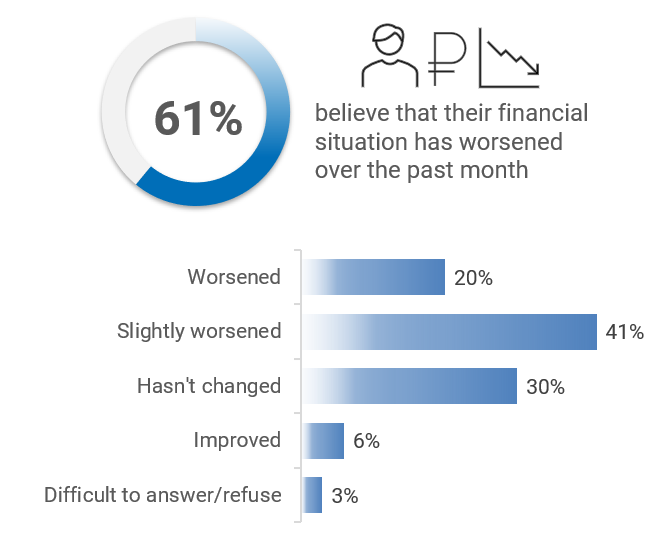Blog about successful marketing strategies in russia
Сhanges in the Buying Behaviour of Russians During the Sanctions Period


DIGITAL MARKETING
Share this Post
Due to the tightening of the sanctions policy towards Russia, many foreign companies had to leave the region in early March 2022. After that, the Russian market began to change dramatically in all areas of its activities.
Experts concur in the opinion that the exiting the market does not "play" to the benefit of the companies that have left. On the contrary, it will be much more difficult for them to get back to Russia than for new brands.
Learn more from the White Paper Russian Market Under The Influence Of Western Sanctions. Possible Prospects For New Brands.
“Russia has been an attractive market and will remain so… Everyone understands that it is easy to leave the Russian market, but it will be very difficult, almost impossible to return… Their place in the market will be taken quickly, within a month or three, and they will not be given back.” - Elena Basalaeva, Professor of the Plekhanov Russian University of Economics, expert of Executive.ru convinced.
PepsiCo, which ranks 7th in the list of advertisers in Russia, was one of the first to think about this important moment. The company's head office announced the suspension of its activities on March 9, 2022 (Pepsi, Mirinda, 7Up brands). However, the Russian representative office of PepsiCo began to actively explore the possibilities of further development through the appearence of the new brand New Cola and think about the release of a separate line of drinks in the Russian region. Moreover, the company already has a local brand “Russian gift” (kvass), which can significantly expand its range in the future.
Anton Stelmakov, one of the founders of Famous Amazing Brands, believes that PepsiCo can change the recipe of beverages so that new products are not associated with the gone brands. Many experts consider such a marketing move to be the most optimal for those companies that still decide to return to the Russian market after a while (if we are talking about consumer goods and the mass market category as a whole). Since the Russian consumer has already begun to change the attitude towards them.
This was stated by the NAFI analytical center, considering that 45% of Russians had a negative response to foreign brands that left the market. 63% of respondents are ready to use the companies' products If they resume their activities, while 67% do not regret the termination or suspension of operation of such companies.
Besides, 23% of Russians have completely lost their loyalty and will no longer buy the products of the brands that have left the market, and 22% condemn the policy of companies (although they may buy products when they resume their activities in Russia). This position is mostly common for an audience over 45 years old.
Young Russians (18-24 years old), as well as middle-aged citizens (35-44 years old) turned out to be more neutral. They have not changed their attitude towards foreign brands and plan to purchase goods again if the opportunity arises. Along with this, Russians especially regret the departure of McDonalds, IKEA, Inditex (Zara, Bershka etc.). In other words, it comes to the products from mass-market category and consumer goods.
Whilst, an ambiguous political situation has arisen in the luxury segment.
Bloggers Protest Against Chanel
It is no secret that the activity of any successful brand is based not only on the sale of goods, but also on the creation of a common ideology of the company. This is the way a regular audience of a trademark is formed that support its principles and values. In the case of luxury brands, this connection is much stronger. If it “breaks”, then it is almost impossible to return the customer.
Unfortunately, such a future is possible for the famous French brand Chanel in Russia. Like most foreign companies, at the beginning of March 2022, the brand suspended its activities in the country, canceling the supply of products, and closed the online store. All this was obvious and many of the company's clients in Russia reacted quite loyally to such a decision.
However, after a while the brand introduced new restrictions for Russian buyers living in other countries. After that, the company was literally hit by a wave of criticism.
This all started when a popular Telegram channel author Laura Jugelia published the news that her friend was not sold things on the grounds of nationality (Comment: a citizen of Russia) in the Chanel boutique in Dubai. A similar case occurred with a Russian woman Lisa Litvin, who was asked to sign an official refusal to use the brand's items on the territory of the Russian Federation. The situation was highlighted in the popular Russian telegram channel Antiglyanets after which representatives of Chanel tried to correctly explain their position related to sanctions against the Russian Federation, but it was too late.
Russian bloggers have launched a flash mob on social networks aimed at complete refusal from the company's products. Marina Ermoshkina,Ekaterina Guseva,Victoria Bonya and others were noted in the action.

Within a short period, the anti-brand initiative turned into damage to real estate. In early April, several Chanel boutiques (Moscow, Paris) were tagged with stickers with the image of Adolf Hitler as a sign that the company supports racial discrimination against its Russian customers.
The statement turned out to be quite serious and affected the values of not only the company's customers, but also a huge percentage of the loyal audience. Most likely, Chanel will be restoring its image for a rather long time both in Russia and abroad. Because the brand's reputation has already destroyed significantly due to the general publicity of the negative event associated with it.
It should also be understood that the return to the market is a more complex marketing strategy for any company. In the current economic and political situation, it is possible according to various “scenarios". Including those related to the appearance of a new brand or a change-expansion of the assortment (for example, PepsiCo).
At the same time, in all cases it is necessary to take into account the fact that the current situation has changed the Russian audience as a whole. Or rather, its buying behavior.
Course to Budget Savings
"Many Russians have met the current economic difficulties before they had time to recover from the financial difficulties caused by the pandemic. Employees of commercial companies in a range of industries, aspiring entrepreneurs, older people left without work, as well as young specialists have experienced rough time situation again. Russians expect the need for even more austerity and the search for additional earnings..." (Timur Aimaletdinov, Deputy General Director of the NAFI Analytical Center).
This opinion is supported by many experts, saying that the consumer behavior of Russians has become aimed at saving of budgets.
The Romir company, which counts the FMCG index of goods on the market on a monthly basis, found out that in March, Russians reduced this indicator by 0.7% compared to the previous month. Experts consider this a negative factor, since the FMCG Index characterizes the level of well-being of the population. Moreover, the size of the share of budgets for consumer goods determines the amount of funds for other needs, including leisure, health, clothing, improving living conditions, etc.
NAFI experts recently found out that 66% of Russians are going to reduce their expenses due to the new economic and political living conditions. Besides, more than half of citizens plan to look for extra earnings, 25% are ready to spend previously accumulated funds in case of critical financial difficulties. Furthermore, some Russians are also considering selling part of the property.
There are also differences in behavior by gender. Women are more serious about cutting costs than men (72% vs. 60%, accordingly). At the same time, the female audience does not plan to actively give up their accustomed lifestyle: 56% will look for additional earnings, 27% are going to spend their existing savings and 16% in extreme cases will use credit cards to cover current expenses. While men are more inclined to sell property (21%) or borrow money from their friends (24%).
Experts from Online Market Intelligence (OMi) also indicated a trend towards savings among Russians (75% of survey participants with average income) in the current period. According to their data, more than 50% of respondents plan to reduce spending in the near future. Of them, 61% of respondents have already bought or are planning to buy goods as a reserve. Basically, we are talking about food and household chemicals and hygiene products.
61% believe that their financial situation has worsened. For almost each of the surveyed categories , more than 50% of respondents choose a savings strategy (except for medicines and baby food). Already now people are saving on HoReCa channel and subscriptions
Source: OMi research “Dynamics of changes in consumer behavior, media consumption and perception of the situation”
If we talk about the sphere of media consumption, then both men and women abide by approximately the same decisions. The majority of respondents are planning to refuse - they refused the social media that were blocked in the Russian Federation. Currently, citizens over the age of 45 use TV channels and news feeds on the main search pages; young people use Telegram and Youtube. Along with it, some women still turn to bloggers on Instagram for information*. But there are much fewer of them: 31% of women (before the resource was blocked, there were 77%). It should be mentioned that a young audience under 24 still uses the service via VPN.
The percentage of Youtube users has also decreased, but insignificantly in comparison with other sources. Now it is 80% (it was 94%). But the Russian audience of Facebook* and Twitter has noticeably decreased: 11% (was 51%) and 8% (was 28%) respectively. The peak of the use of all social networks was the period from February 24 to March 2.
Source: OMi research “Dynamics of changes in consumer behavior, media consumption and perception of the situation”
On the other hand, the dynamics of visiting popular marketplaces has not changed much at the moment. The only exception was Aliexpress, which is understandable, since there are many goods from countries unfriendly to Russia on this website.
What Does This Mean?
All these factors must be taken into account when promoting on the Russian market, as well as to understand why consumer behavior has changed in favor of economy of financial resources. According to the OMi study, it is clear that the majority of Russians are stressed due to the current political situation, especially women. It is logical to assume that it entails a low level of purchasing power and negative emotions.
Therefore, the marketing strategy of any brand (gone or completely new on the market) should be built on the same principle of benefits and economy, which is now very relevant for Russians. Entrust this task to RMAA specialists who are ready to find the right approach to any segment of the target audience in Russia.
*Social networks are recognized as extremist and banned in Russia.
Join 2,000+
of your Peers!
You will be the first to know about Russian marketing insights, news and updates from our agency. Stay tuned!
Get our latest articles delivered to your email inbox and get our exclusive White Paper
"Digital Marketing in Russia. Finding your customers on the internet"
for FREE!
Russian Digital Market Overview
Strategic Insights into Russian Digital Marketing Landscape

Ready to partner with the specialists in Russian marketing and advertising?
About the Author
A content lead. Natalia runs marketing projects promotion with different digital tools in the Russian-speaking market.
Join 2,000+ of your Peers!
Get our latest articles delivered to your email inbox and get our exclusive White Paper "Digital Marketing in Russia. Finding your customers on the internet" for FREE!
You will be the first to know about Russian marketing insights,
news and updates from our agency.
Stay tuned!
We're updating our website's design step by step, so some pages may look different. Thank you for your understanding.
Got it
















